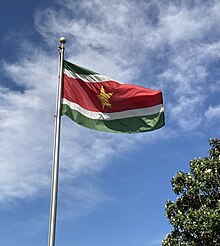 | |
| Use | National flag and ensign |
|---|---|
| Proportion | 2:3 |
| Adopted | 25 November 1975; 49 years ago (1975-11-25) |
| Design | A horizontal triband of green (top and bottom) and red (double width) with large white border with the large yellow five-pointed star centered on the red band. |
| Designed by | Jack Pinas |



The flag of Suriname (Dutch: Vlag van Suriname) was legally adopted on 25 November 1975, upon the independence of Suriname from the Netherlands.
The flag was designed as a result of a national competition. It was raised for the first time on the Independence Day of the Republic of Suriname. There is a legal requirement for vessels to raise the flag of Suriname when visiting another country to reduce miscommunication between other countries.
Description
The flag of Suriname is composed of five horizontal bands of green (top, double width), white, red (quadruple width), white, and green (double width) with a large, yellow, five-pointed star in the center.
The color red represents progress, white represents freedom and justice and the green represents the fertility of the land. The yellow star represents unity and a golden future.
| Scheme | Green | White | Red | Yellow |
|---|---|---|---|---|
| Hexadecimal | #377e3f | #FFFFFF | #b40a2d | #ecc81d |
| RGB | 55, 126, 63 | 255, 255, 255 | 180, 10, 45 | 236, 200, 29 |
| Pantone | 356C | n/a | 186C | 116C |
| NCS | 3060 G 10 Y | n/a | 1080 Y 90 R | 0580 Y 10 R |

Shapes and design
Flag of Suriname
The flag was designed as a result of a national competition, with the winning design being accepted by the Surinamese parliament in 1975. Jack Pinas, art teacher and graphic designer, won the design competition. However, some changes on Pinas' design were made.
The green horizontal band on both the top and bottom of the flag represents the richness of the country's agricultural lands; the white horizontal band represents freedom and independence and red symbolizes progress and hope. The star on center of the flag reflects the sacrifices endured for the Surinamese independence as well as the unity of the country and a bright future. The Surinamese political parties are indicated by the different colors that are used in the flag.
Coat of arms

In 1770, the coat of arms belonged to the City of Amsterdam. However, in 1975, the year of Suriname's independence, Suriname introduced a new coat of arms to acknowledge and respect the indigenous population as well as to represent the new country.
It consists of two Arawak Indians who represent the unity of the Indigenous people. The bright yellow star in the center symbolizes the people that migrated to Suriname including America, Asia, Africa, Australia, and Europe. The green diamond shape in the middle represents a hart.
The oval shape shield that is divided into two portrays a boat on the left side and rain forest on the right. The boat on the left side represent the history of slavery in Suriname and the people that were shipped from Africa. The right side of the shield, symbolizes justice. At the bottom shield there is a banner stating 'JUSTITIA PIETAS FIDES'. Justitia means 'justified', Pietas means faithfulness towards God, family and country, and lastly, Fides means loyalty to commitment.
In 1682 the coat of Suriname still belonged to the Dutch West India Company, until Suriname established the 'Society of Suriname' in 1683.
Historical flags
Flag used in 1815–1959
After the establishment of the Kingdom of the Netherlands in 1815, the Dutch tricolor was used in the Dutch colony of Suriname. There was talk of a design for a colony flag with the Dutch tricolor with the coat of arms of Suriname in the white area, but in practice this was not used.
The governor's flag before 1959 was the flag of the Netherlands with white circles in the top left corner. The same governor's flag was also used by the governors of the Netherlands Antilles and Netherlands New Guinea respectively.
First flag, 1959–1975
After the signing of the Charter for the Kingdom of the Netherlands on 15 December 1954, the need arose for Suriname's own official flag, coat of arms and anthem.
The pre-independence flag was designed by Noni Lichtveld and was adopted in 1959. It consisted of five coloured stars connected by a black ellipse with a plain white background. The coloured stars represented the major ethnic groups that comprise the Surinamese population, being black (Africans), brown (Asian Indians), yellow (Javanese and Chinese), red (Amerindians), and white (Europeans). The ellipse represented the harmonious relationship among the groups.
This flag was also used as the governor's flag. However, the flag was criticized by the wider public for putting too much emphasis on the ethnic differences and therefore symbolizing less of the national unity of the Surinamese people. It was changed to the current flag in late 1975 after a nationwide contest.
-
 Flag used until 1959
Flag used until 1959
-
 Proposed flag of the Dutch colony of Suriname
Proposed flag of the Dutch colony of Suriname
-
 Governor's standard from 1920 to 1966
Governor's standard from 1920 to 1966
-
 Standard of the governor, 1966–1975
Standard of the governor, 1966–1975
-
 Flag of Suriname Until 1975
Flag of Suriname Until 1975
-
 The Flag of Suriname
The Flag of Suriname
-
 Standard of the prime minister, 1975–1988
Standard of the prime minister, 1975–1988
-
 Presidential standard
Presidential standard
References
- "Oorspronkelijke ontwerper Surinaamse vlag overleden". Waterkant.net (in Dutch). 17 September 2016. Archived from the original on 25 April 2023. Retrieved 16 March 2019.
- ^ Meel, Peter (1998). "Towards a typology of Suriname nationalism". New West Indian Guide / Nieuwe West-Indische Gids. 72 ((3-4)): 257–281. doi:10.1163/13822373-90002593. S2CID 128539085. Archived from the original on 16 February 2020. Retrieved 8 October 2020.
- ^ Hoefte, Rosemarijn (January 2014). Suriname in the Long Twentieth Century: Domination, Contestation, Globalization. Palgrave Macmillan. p. 136. doi:10.1057/9781137360137. ISBN 978-1-349-47183-6. Archived from the original on 11 August 2022. Retrieved 9 October 2020.
- Bouterse, Desire. D (2017). "Bulletin of Acts and Decrees the Republic of Suriname" (PDF). Archived (PDF) from the original on 31 October 2021. Retrieved 7 October 2020.
- "KennisbankSur Vlag Suriname" (PDF) (in Dutch). Archived from the original (PDF) on 8 August 2019. Retrieved 1 November 2020.
- ^ Smith, Whitney (25 September 2019). "Flag of Suriname". Britannica. Encyclopædia Britannica. Archived from the original on 29 May 2020. Retrieved 8 October 2020.
- "Original designer Surinamese flag passed away". 2016. Archived from the original on 25 April 2023. Retrieved 16 November 2020.
- ^ Hollingsworth, Anwar Ignatius (2014). "The Indigenous Peoples Conservation Rights in Suriname a United Nations (UN) Declaration: Review of the Declaration Implementation" (PDF). Archived (PDF) from the original on 23 October 2021. Retrieved 10 October 2020.
- "Colonial Flags of Surinam". Archived from the original on 8 November 2020. Retrieved 13 November 2020.
- Flaggenbuch. Melchior Historischer Verlag. 2014. ISBN 978-3-944289-66-3.
- "Hubert Herald". Archived from the original on 10 February 2021. Retrieved 14 November 2020.
- Kannik, Preben. Vlaggen, standaarden en wapens (in Dutch). HJW Becht Amsterdam.
- "Suriname – Colonial Flags". flagspot.net. Archived from the original on 3 July 2002. Retrieved 23 December 2013.
External links
| Flags of South America | |
|---|---|
| Sovereign states | |
| Dependencies and other territories | |
| Suriname articles | |||||
|---|---|---|---|---|---|
| History |  | ||||
| Geography | |||||
| Politics | |||||
| Economy | |||||
| Society |
| ||||